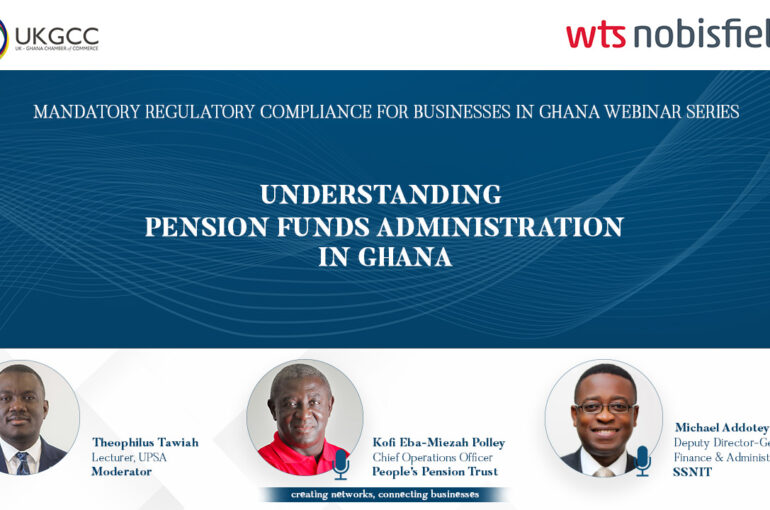Pay pension contributions of employees to promote industrial harmony –SSNIT Deputy Director
Pay pension contributions of employees to promote industrial harmony –SSNIT Deputy Director


Michael Addotey Addo, the Deputy Director General, Finance & Administration, of the Social Security and National Insurance Trust (SSNIT), has called on employers to pay the pension contributions of their workers in line with Act 766 of the National Pensions Act, 2008 to enhance industrial harmony in Ghana.
According to him “we have realised it promotes industrial harmony where you have unionised workers who agitate a lot. When this is taken care of, there is less agitation”, as it assures workers of a livelihood after retirement.
He made these remarks during the UK- Ghana Chamber of Commerce’s (UKGCC) third Mandatory Regulatory Compliance for Businesses in Ghana webinar series 2023, on the topic “Understanding Pension Funds Administration in Ghana.”
The SSNIT Pensions Act
The National Pensions Act, 2008, which was enacted as a three-tier pension scheme to oversee the administration and management of registered pension schemes and trustees of registered schemes, enables SSNIT to manage the first tier of contributions and provide for related matters. The law mandates SSNIT to register all employers and workers as the scheme seeks to provide cover for the loss of workers’ income through the payment of monthly pensions in the event of old age or permanent invalidity until death.
Speaking during the webinar, Mr. Addo urged employers to see pension contributions for their employees as not only a legal requirement done to avoid court actions, fines, penalties, and jail terms, but also as a tool to improve productivity and boost morale, which help retain staff.
According to Mr. Addo, companies that comply with the pension law are considered good corporate citizens.
Membership of SSNIT (Eligibility)
All workers within the formal and informal sectors in Ghana, as well as self-employed individuals between the ages of 15 – 45 years, are eligible to register for the pension scheme. Categories of workers include permanent or full-time employees, self-employed, temporary or contract staff, casual staff, part-time employees, and seasonal employees.
Distribution of funds under Act 766
Explaining the structure and distribution of pension contributions, Mr. Addo remarked that out of the 18.5 percent of funds paid, 2.5 percent goes to the National Health Insurance
Scheme (NHIS) to support healthcare. Therefore, SSNIT contributors do not pay NHIS premiums. 5 percent is also paid to a Private Fund Manager of an employee’s choice and the remaining 11 percent is retained and managed for the pension of an employee. Tier 2 is a mandatory scheme privately managed, and Tier 3 is a voluntary scheme privately managed of which up to 16 percent of an employee’s basic salary exempted from tax can be contributed.
Benefits of the SSNIT Scheme
Besides the payment of old age pension where SSNIT pays retired employees a monthly allowance until death, Mr. Addo remarked that there is the payment of invalidity pension and emigration lump sum.
“If a person dies before the age of 75 after retiring at 60, SSNIT will compute and assume that the person lived till 75 and then pay a sum of money to the beneficiaries. In effect, employees have a guaranteed 15 years certain in the pension scheme”. Mr. Addo said.
According to Mr. Addo, Invalidity pension occurs when an employee gets injured and is thus unable to work. In this instance, SSNIT will pay pension based on certain requirements until full recovery or death.
Emigration lump sum is another benefit of the scheme. According to the law, all foreign workers in Ghana returning to their home country are entitled to their contributions with interest.
Furthermore, old age lump sum is paid to workers who did not meet the stipulated 15 years required by law; their contributions will be paid with interest.
Corporate Trustee Role
Mr. Kofi Polley, the Chief Operations Officer of People’s Pension Trust, a UKGCC platinum member company, speaking to issues relating to Tier 2 pension fund administration, refuted assertions that employee pension funds are being mismanaged. He also refuted assertions that clients encounter difficulties claiming these funds when they mature.
“Ours is even more strict because the investment guidelines are directly from the regulator, the National Pensions Regulatory Authority (NPRA), and we are given allocations as to where we can invest these funds. So, corporate trustees cannot decide to invest outside the stated guidelines”.
He further remarked that the downturn of the Ghanaian economy affected some investments, but it was not due to mismanagement on the part of corporate trustees.
“One good thing about pension funds is that because they are long-term funds, they are very resilient to such turbulence.”
Mr. Polley urged business owners to pay their employees’ pension contributions to prevent ‘old age poverty’ which he referred to as “a clear and present danger”.
He also indicated that the pension industry will intensify public education to encourage more people in the informal sector to safeguard their future.
In addition to informal sector pensions, the webinar also discussed related issues such as employers’ obligation, offences and punitive measures, and how and where SSNIT invests pension funds.
The webinar was moderated by Theophilus Tawiah, Managing Partner at WTS Nobisfields and Lecturer at the University of Professional Studies. Click here to watch the webinar.



